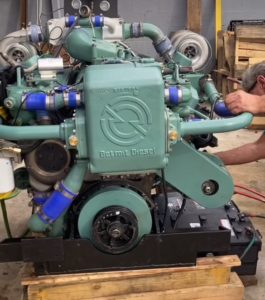Proper maintenance of Detroit Diesel 92 Series engines is essential to ensure reliability, efficiency, and longevity. By adhering to these best practices, operators can prevent unexpected failures, optimize engine performance, and extend the lifespan of their engines.

1. Use High-Quality Fluids and Parts
- Engine Oil:
Always use high-quality lubricants that meet or exceed Detroit Diesel’s specifications. For most operating conditions, SAE 15W-40 is recommended. In extreme temperatures, consult specific oil grades suited for the environment.
- Coolants:
Use a 50/50 mixture of ethylene glycol antifreeze and distilled water, or the appropriate coolant blend for marine and industrial applications. Add supplemental coolant additives (SCAs) to prevent cavitation and corrosion.
- Fuel Filters and Injectors:
Invest in premium aftermarket fuel filters and injectors to ensure clean and efficient fuel delivery. Avoid substandard components that may lead to engine inefficiency.
- Replacement Parts:
Always opt for high-quality aftermarket parts like pistons, liners, and gaskets designed to match or exceed original specifications.
2. Follow Manufacturer Specifications
- Torque Specifications:
Use a torque wrench to ensure all bolts and fasteners meet the exact torque requirements. Over-tightening or under-tightening can lead to leaks or component failure.
- Clearances:
Maintain specified valve and injector clearances to ensure optimal timing and fuel delivery. Periodically check clearances using feeler gauges and adjust as necessary.
- Fluids and Intervals:
Follow the recommended intervals for oil changes, coolant flushes, and fuel filter replacements. For engines operating under severe conditions, shorten maintenance intervals accordingly.
- Gaskets and Seals:
Replace gaskets and seals during routine maintenance to prevent leaks and maintain proper compression.
3. Monitor Engine Performance
- Key Indicators:
Regularly monitor oil pressure, coolant temperature, and exhaust color. Deviations from normal ranges may indicate underlying issues.
- Diagnostics:
Utilize Detroit Diesel Electronic Controls (DDEC) I-IV systems to track real-time engine data and identify problems before they escalate.
- Compression Tests:
Perform periodic compression tests to ensure consistent cylinder performance and detect early signs of wear or damage.
- Noise and Vibration:
Pay attention to unusual engine noises or excessive vibration, which may signal problems with bearings, mounts, or other components.
4. Maintain Records
- Maintenance Logs:
Keep detailed records of all maintenance activities, including oil changes, part replacements, and diagnostics. This helps track patterns and predict future maintenance needs.
- Performance Trends:
Record key performance data, such as fuel efficiency and engine hours, to identify trends and schedule preventive maintenance.
- Repair History:
Document all repairs and replacements to ensure a clear history for troubleshooting and resale purposes.
5. Emphasize Training and Safety
- Personnel Training:
Ensure all operators and technicians are trained in proper maintenance procedures and safety protocols. Knowledgeable personnel reduce the likelihood of errors during servicing.
- Use PPE:
Always wear personal protective equipment (PPE), such as gloves, goggles, and ear protection, to minimize risks during maintenance.
- Safety First:
Follow safety guidelines for working with high-pressure systems, heavy components, and hazardous fluids. Never bypass safety devices like air shut-off valves or pressure relief systems.
Conclusion
Adhering to these best practices is crucial for maintaining the performance and reliability of Detroit Diesel 92 Series engines. By using high-quality fluids and parts, following manufacturer specifications, closely monitoring performance, maintaining detailed records, and prioritizing safety and training, operators can ensure their engines remain in peak condition across a wide range of applications. These practices not only extend engine life but also contribute to operational efficiency and cost savings.
Relevant Parts Links:
- Fuel Injectors
- Alternators & Starters for 92 Series Engines
- Full List of Cooling System Links for Detroit Diesel 92 Series Engines (6V92, 8V92, 12V92, 16V92)
6V92 Engines
- Non-Turbocharged Models
- Fresh Water Pump for Detroit Diesel 6V92 Non-Turbo Engines
- Raw Water Pump for Detroit Diesel 6V92 Non-Turbo Engines
- Turbocharged Models
- Fresh Water Pump for Detroit Diesel 6V92 Turbo Engines
- Raw Water Pump for Detroit Diesel 6V92 Turbo Engines
8V92 Engines
- Non-Turbocharged Models
- Fresh Water Pump for Detroit Diesel 8V92 Non-Turbo Engines
-
Raw Water Pump for Detroit Diesel 8V92 Non-Turbo Engines
- Turbocharged Models
- Fresh Water Pump for Detroit Diesel 8V92 Turbo Engines
- Raw Water Pump for Detroit Diesel 8V92 Turbo Engines
12V92 Engines
- Non-Turbocharged Models
- Fresh Water Pump for Detroit Diesel 12V92 Non-Turbo Engines
- Raw Water Pump for Detroit Diesel 12V92 Non-Turbo Engines
Turbocharged Models
- Fresh Water Pump for Detroit Diesel 12V92 Turbo Engines
- Raw Water Pump for Detroit Diesel 12V92 Turbo Engines
16V92 Engines
- Non-Turbocharged Models
- Fresh Water Pump for Detroit Diesel 16V92 Non-Turbo Engines
- Raw Water Pump for Detroit Diesel 16V92 Non-Turbo Engines
Turbocharged Models
- Fresh Water Pump for Detroit Diesel 16V92 Turbo Engines
- Raw Water Pump for Detroit Diesel 16V92 Turbo Engines
- Gaskets for 92 Series Engines
- Gasket Kits for 6V92 Non-Turbo
- Gasket Kits for 6V92 Turbo
- Gasket Kits for 8V92 Non-Turbo
- Gasket Kits for 8V92 Turbo
- Gasket Kits for 12V92 Non-Turbo
- Gasket Kits for 12V92 Turbo
- Gasket Kits for 16V92 Non-Turbo
- Gasket Kits for 16V92 Turbo
- Overhaul Kits For Detroit Diesel 92 Series Engines



 Free US Calls: 1-888-433-4735
Free US Calls: 1-888-433-4735 International: 305-545-5588
International: 305-545-5588